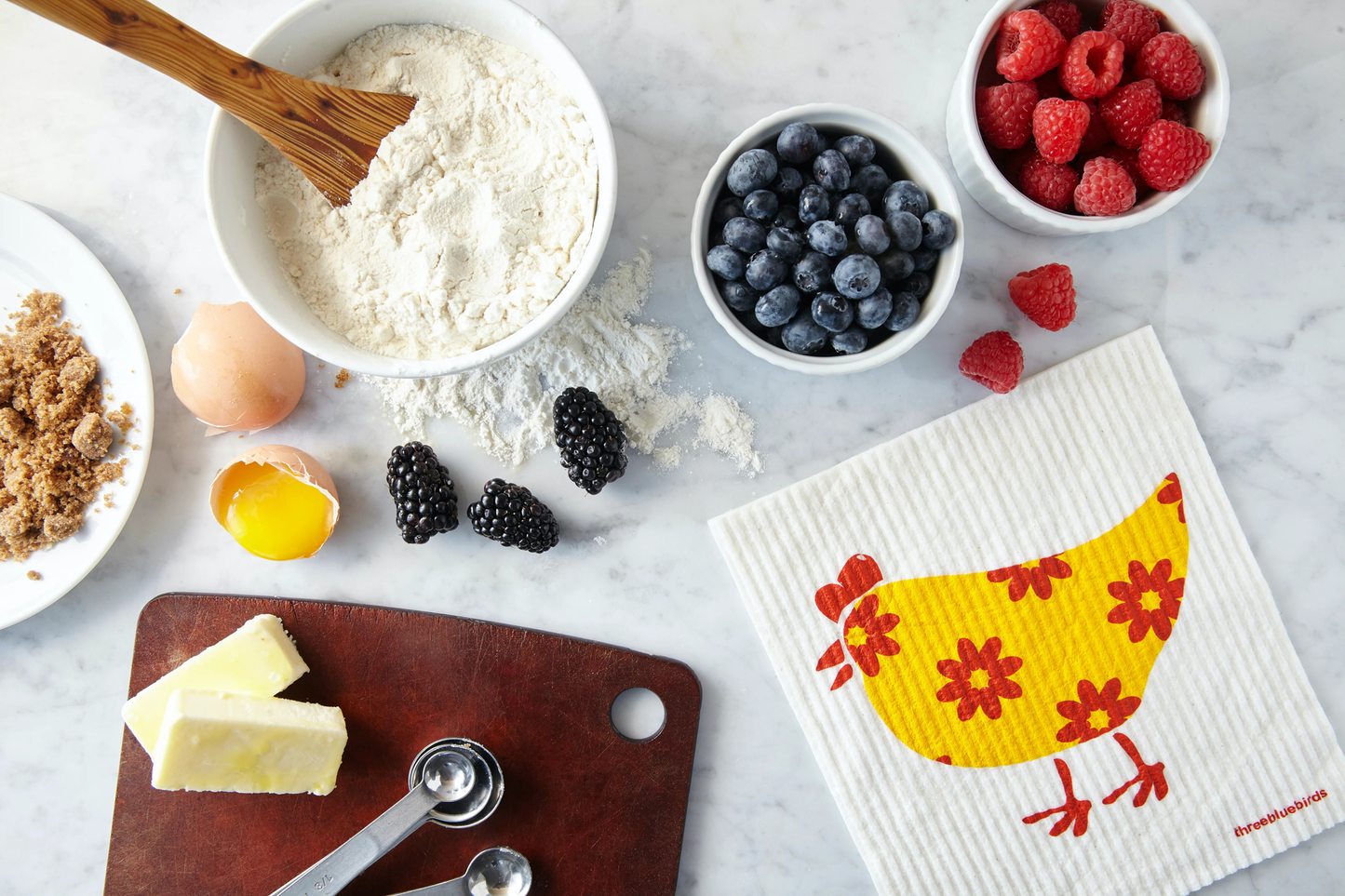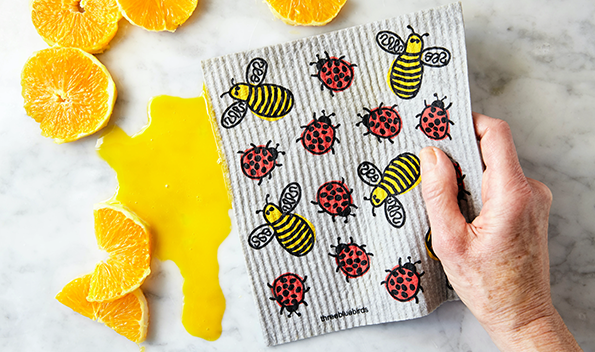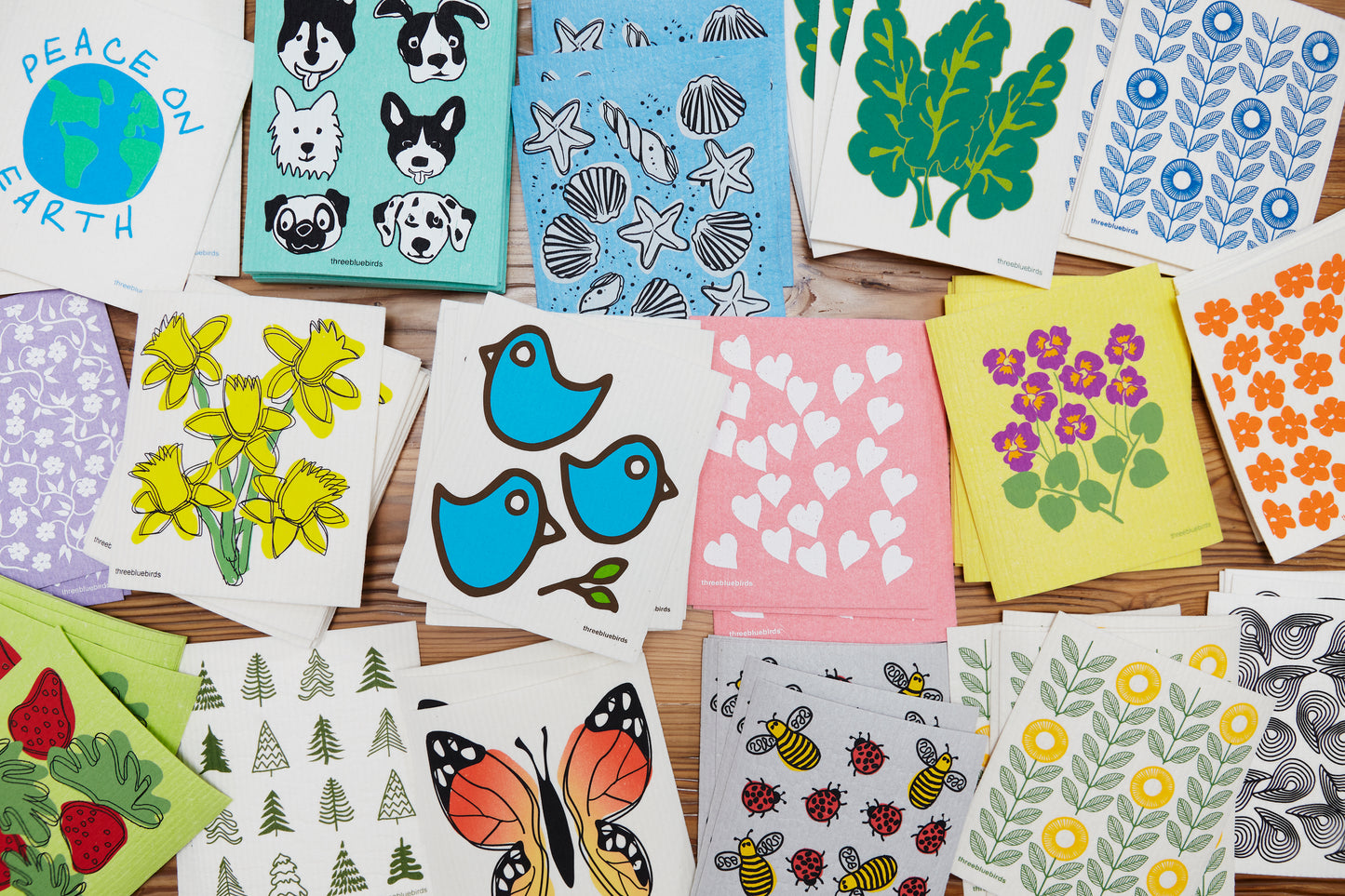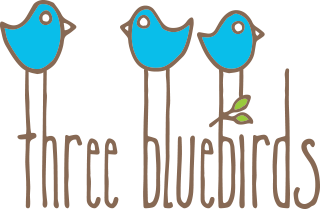
FAQs

Got a question?
Check below for the answer – or send us a chirp at
What's a Swedish Dishcloth?
We've got a whole page on this! A Swedish Dishcloth is an eco-friendly cleaning cloth that replaces sponges and paper towels. You can use it to clean countertops, do dishes, dust, and for general household chores. It cleans granite, stainless steel, glass, and wood – streak-free. A Swedish Dishcloth is more efficient than paper towels, which are wasteful. One absorbs about 20 times its weight, and a single Swedish Dishcloth is able to do the job of 17 rolls of paper towels — saving trees, water, and money. It's also more hygienic than sponges.
How do you use a Swedish Dishcloth?
We have a whole page on this too! But in brief, just wet it with water and squeeze it out to make it more absorbent. You can use sprays, soap, or just water with it.
Can you use them on windows?
Yes, they work great with vinegar and water or glass cleaner.
How do you clean it?
A Three Bluebirds Swedish Dishcloth can be cleaned in lots of ways! You can clean it in the washing machine or in the top rack of the dishwasher. To sterilize, it can also be boiled briefly or microwaved when damp 30 - 60 seconds. To air dry, hang it over the faucet, on the side of the sink, or lay flat. Do not tumble dry. Overuse of extra-strength detergent may cause deterioration. Read more about how to care for and use your Swedish Dishcloth here .
How often do you clean it?
However you choose to wash your dishcloth, you should do so every couple of days.
What if it gets stained?
Vinegar and water will also help with stains. If you rinse it out after each use, it will stay nice looking for longer. We recommend washing it a couple of times per week.
Can it be bleached?
Bleach is a toxic chemical that is harmful to the environment. We advise caution and recommend that you avoid using bleach if possible. It is not necessary to use bleach to keep your dishcloth hygienic and clean. Even if a dishcloth has some residual stains, that does not mean it is dirty. Your cloth will be hygienic and clean if you put it in the washing machine, although it may be discolored. If you do decide to use bleach, it must be used in very limited quantities. You can either put a quarter-cap of bleach into the laundry and wash your dishcloth normally, or spray your dishcloth with a water solution (10% bleach, 90% water) and let it sit for no longer than one hour. Do not let the dishcloth soak (in water or bleach) for any extended period of time because this will cause the fibers to break down. If you choose to use bleach, the dishcloth will have a shorter lifespan than if you did not use bleach.
Do they sour?
If you rinse and squeeze out the excess water after each use, they will air dry fast and not sour. Do not let them sit in water.
How long do they last?
It depends on use and care. They generally last between 6-9 months. They are compostable and 100% biodegradable to a.
What is it made out of?
Each Swedish Dishcloth is made of 70% cellulose and 30% cotton. The wood-based cellulose comes from sustainable forests, and is FSC (Forest Stewardship Council) certified. The inks are water-based and non-toxic.
Does the printed design last long?
The inks are baked onto the dishcloth. They will last for 6-9 months before they start to fade.
How are they made?
One of the co-owners, Lasse, is the artist. They are screen-printed with water-based inks in Connecticut. We are local, and we have been in business since 2013. The material that we use is the original material invented by a Swedish engineer in 1949. The material is sourced from Europe.
What is your returns policy?
If you are not happy with your Swedish Dishcloth, please give us a call (+1 203-637-6832) or send us an email (shop@threebluebirds.com) and we will make it right.
Where else do you sell?
We sell year-round online on our website, and in stores across the country. We also hold stands at some local markets in the Tri-State Area and New York City (including the Union Square, Columbus Circle, and Bryant Park Holiday Markets). We are also carried in many local shops across the United States! You can check out our Events page to find us at markets near you.
What does your partnership with '1% for the Planet’ mean?
We pledge 1% of our annual sales to support wetland and habitat restoration. This directly translates to 20 gallons of water restored per dishcloth sold. You can learn more about our environmental impact on our Sustainability page.
Watch out for knock-offs!
Many so-called “Swedish Dishcloths” available online are knock-off products (often made in China). These are inferior quality products with substandard material and printing methods. There is a lack of transparency in their production and manufacturing.
We're the real deal! We use authentic, patented Swedish Dishcloth material for genuine quality and impact. Read our press release to learn more.


